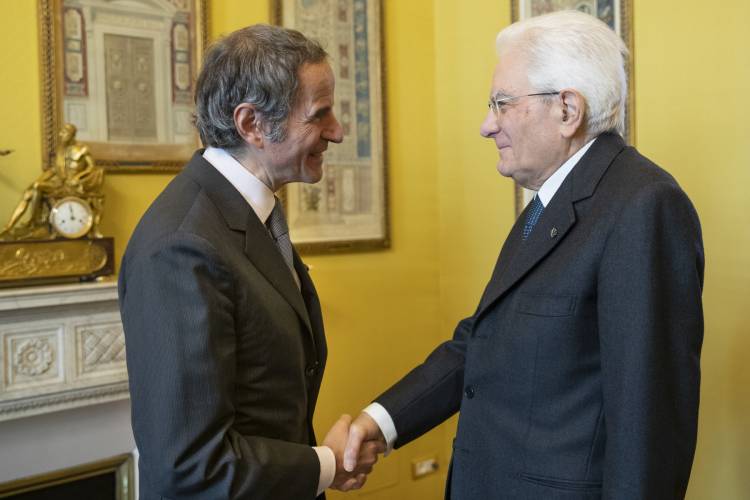Italy is a steadfast partner in the challenges facing the IAEA today with a long history of achievements in the nuclear field, Director General Rafael Mariano Grossi emphasized this week as he travelled to Rome to meet with country's leadership. In a two-day visit, Mr Grossi met with Italy's President and Foreign Minister, as well as His Holiness Pope Francis, to engage on a variety of issues including nuclear safety and security in Ukraine, nuclear non-proliferation, and the role of nuclear science and technology in combating climate change.
In his meeting with Sergio Mattarella, Mr Grossi thanked the President for his country's continuous support to the IAEA, particularly to the Agency's assistance to the Zaporizhzhya Nuclear Power Plant (ZNPP) in Ukraine - Europe's largest nuclear power plant. In September the IAEA established a permanent presence at ZNPP beset with power outages caused by shelling, putting nuclear safety and security at the plant at risk. Mr Grossi thanked Mr Mattarella for his support to the IAEA's mission.
Mr Grossi also praised Italy's efforts to promote global dialogue. In December the Italian Ministry of Foreign Affairs and International Cooperation and the Italian Institute for International Political Studies (ISPI) organised the high-level initiative 'Mediterranean Dialogues', to engage prominent leaders of Mediterranean governments, business, civil society, media and academia on common challenges. Mr Grossi participated in the event, describing it as a fascinating discussion on the future of multilateralism and the importance of effective international organizations.
Meeting with Italian Deputy Prime Minister and Foreign Minister Antonio Tajani, Mr Grossi thanked Italy for its essential backing to the Agency's work, including through its role as the chair of the IAEA's General Conference - the organization's supreme decision-making body.
Mr Tajani expressed his full support to the IAEA's activities in Ukraine, saying: "Regarding Zaporizhzhya, we are working to protect Europe from possible damage." In September, Italy joined Foreign Ministers from Canada, France, Germany, Japan, the Republic of Korea, Switzerland, the United Kingdom, Ukraine, the United States of America, as well as the High Representative of the European Union for Foreign Affairs and Security Policy, in issuing a joint statement of support for establishing a nuclear safety and protection at ZNPP.

IAEA Director General Rafael Mariano Grossi met with Italian President Sergio Mattarella at the Palazzo del Quirinale in Rome, Italy on 11 January 2023. (Photo: Presidency of the Republic)
Meeting with Pope Francis
On Thursday, Mr Grossi met with Pope Francis, who is the head of state of the Holy See, an IAEA Member State, and Cardinal Secretary of State Pietro Parolin and Secretary for Relations with States and International Organizations Archbishop Paul Richard Gallagher. Humbled and grateful to meet the head of the Roman Catholic Church once again, the two spoke about climate change impacts and the nuclear non-proliferation.
In his discussion with Mr Grossi, Pope Francis echoed points from his recent address to the Vatican's diplomatic corps, in which he reaffirmed his stance on the possession of atomic weapons and the risks they pose.
Mr Grossi and the Pope also spoke about the potential of nuclear science and technology in addressing the worsening global climate crisis. Over the past five decades, nuclear power has cumulatively avoided the emission of about 70 gigatonnes (Gt) of carbon dioxide (CO2) - equivalent to the emissions from the entire global power sector in the five years between 2015 and 2019 - and continues to avoid more than 1 Gt CO2 annually.
After the meeting, Mr Grossi said that he deeply appreciated the encouraging words of the Pope regarding the importance of the IAEA's work in promoting dialogue and solutions based on multilateral negotiations, including in Ukraine.

IAEA Director General Rafael Mariano Grossi and Pope Francis spoke on a range of issues, including climate change impacts and the nuclear non-proliferation. (Photo: Vatican Media)






